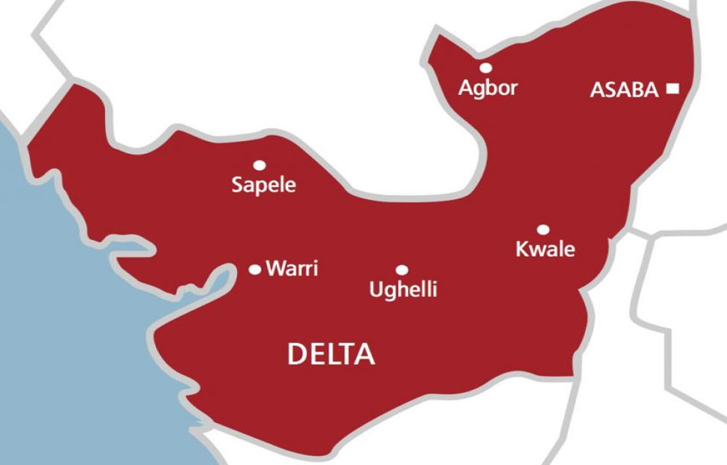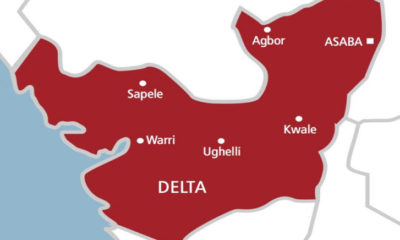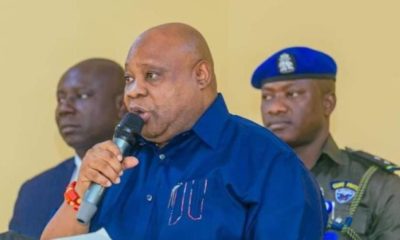NEWS
Delta Govt Sets Up IDP Camps In Readiness For Flooding

As part of proactive measures to mitigate the adverse effects of flooding, the Delta State Government (DSG) has set up Internally Displaced Persons (IDP) Camps in Asaba, Ozoro, Otu-Jeremi, Patani and Kwale.
The state made the disclosure on its verified handle on micro-blogging site, X, on Friday.
The statement added that the DSG has made arrangement for teaching and “relief materials, medications and deploying security personnel”.
It urged the citizens to strive to stay informed and pay priority attention to safety.
ALSO READ: Delta Opens State’s Health Insurance Scheme To Students
It wrote, “Flooding is a frequent and destructive disaster caused by heavy rain, river overflow, or storm surges. It leads to significant damage and displacement — making preparation and awareness crucial to mitigating its effects.
“In Delta State, proactive measures have been put in place to ensure the safety and well-being of Deltans in flood-prone areas. These include establishing Internally Displaced Persons (IDP) Camps in Asaba, Ozoro, Otu-Jeremi, Patani and Kwale, providing relief materials, medications and deploying security personnel. Additionally, teachers will also be assigned to support displaced children.
“Residents are advised to evacuate flood-threatened areas promptly and return only when it is safe. This precaution helps safeguard vital assets such as personal belongings and essential documents, and minimizes the risk of potential loss of life.
“Deltans, stay informed — your safety remains our top priority!”
NEWS
N1.7trn Loan: Atiku Blames NASS For Worsening Nigeria’s Debt Burden
Former Vice President, Atiku Abubakar has criticized the federal government’s plan to secure an additional N1.7 trillion loan through Eurobonds to cover a shortfall in the 2024 budget, describing the borrowing as unsustainable and harmful to Nigeria’s economy.
In a statement shared on Thursday via his X (formerly Twitter) handle, Atiku accused the Bola Tinubu-led administration of burdening Nigerians with debt while failing to provide clear answers about the country’s fiscal challenges.
READ ALSO: CSR: Dangote Cement Fuels Education With Support Projects At Lagos Schools
He also faulted the National Assembly for enabling what he called a “voracious appetite” for loans.
The former Peoples Democratic Party (PDP) presidential candidate expressed alarm over a recent World Bank report ranking Nigeria as the third most indebted country to the International Development Association (IDA), calling the development troubling.
“The recent report released by the World Bank, showing Nigeria as the third most indebted country to the International Development Association (IDA), is very concerning,” Atiku stated.
He raised further concerns about the government’s decision to benchmark the proposed loan at an exchange rate of 1 USD to N800, despite the Central Bank of Nigeria’s official rate being over N1,600.
“What makes this particular loan proposal even more concerning is that it is benchmarked at the exchange rate of 1 USD to N800, whereas the current exchange rate from the Central Bank of Nigeria stands at over N1,600 to 1 USD,” he said.
Atiku questioned the need for additional borrowing, given the government’s earlier claims of record-high revenue collection.
“In July this year, Tinubu boasted that the FIRS and Customs under his watch had collected all-time high revenues to finance the budget. Why are they still borrowing?” he said
He accused the government of a lack of transparency, describing the borrowing spree as detrimental to Nigerians already struggling under economic hardship.
“There is something that they are not telling Nigerians, even as they are being crushed by a combination of their failed trial-and-error policies and loan rackets.”
Atiku also referenced a report by BudgIT, a budget monitoring group, which criticized the 2024 budget for its inefficiencies.
He alleged that corruption, rather than infrastructure or development needs, was driving the government’s borrowing decisions.
“These loans are powered by corruption and not for infrastructure and development needs. This voracious appetite for humongous loans is deeply concerning,” he said.
Reflecting on Nigeria’s financial history, Atiku lamented the return to significant foreign indebtedness just years after former President Olusegun Obasanjo’s administration cleared the country’s debt.
“It is agonizing to see that just a few years after the Obasanjo administration took us out of foreign indebtedness, we are today back at the top spot in the same conundrum,” he stated.
He called for a more cautious approach to borrowing, urging the government to prioritize fiscal responsibility and transparency to avoid worsening Nigeria’s economic challenges.
International News
ICC Issues Arrest Warrants For Israeli Prime Minister Netanyahu, Others
The International Criminal Court (ICC) has taken a historic step, issuing arrest warrants for Israeli Prime Minister Benjamin Netanyahu and former Defense Minister Yoav Gallant.
The charges include crimes against humanity and war crimes allegedly committed during Israel’s recent assault on Gaza.
In a detailed statement, the ICC accused the Israeli leaders of “intentionally and knowingly depriving the civilian population in Gaza of objects indispensable to their survival, including food, water, and medicine and medical supplies, as well as fuel and electricity.”
READ MORE: Osun Govt Decries Attempted Murder Of Park Mgt Chairman By Police
The ICC’s move marks a significant escalation in international scrutiny of the Israeli-Palestinian conflict. Netanyahu and Gallant are alleged to have orchestrated policies that caused severe harm to the civilian population in Gaza, leading to widespread condemnation from human rights organizations.
Alongside the charges against Israeli officials, the ICC also issued an arrest warrant for Hamas military commander Mohammed Deif. Deif has long been a central figure in Hamas’s military operations. Israel’s military claims to have killed him in a July airstrike, although this has not been independently verified.
The warrants highlight growing calls for accountability amid the ongoing conflict in the region. The ICC’s actions are likely to provoke heated debate and may complicate diplomatic efforts aimed at resolving the crisis.
With the warrants issued, global attention now turns to how the international community will respond and whether any practical steps will be taken to enforce them.
NEWS
Edo State Governor Sets Up Committee To Recover Missing Gov’t Vehicles
Governor Monday Okpebholo of Edo State has inaugurated a 12-member committee tasked with recovering government vehicles reportedly in private hands.
The committee, led by Kelly Okungbowa, has been given a two-week mandate to retrieve the vehicles and ensure their return to the state government.
READ ALSO: Finnish Police Arrest Simon Ekpa Over Terror-Related Allegations
Speaking during the inauguration ceremony in Benin City, Governor Okpebholo emphasized the importance of accountability in the management of public resources.
He urged the committee to carry out its assignment thoroughly and within the bounds of the law.
In his response, Okungbowa expressed gratitude to the governor for entrusting the team with the assignment, vowing to deliver results within the stipulated timeframe.
“A lot of vehicles used by the past administration are missing, as those in custody of the vehicles have refused to return them,” Okungbowa said.
“The governor deemed it fit to inaugurate us today with a mandate to recover all government vehicles in private hands.”
The committee, which includes representatives from Edo’s three senatorial districts, is set to investigate and recover the vehicles based on credible intelligence already at their disposal.
“We already have vital information regarding some persons still holding government vehicles,” Okungbowa stated. “We will do the job according to the law, and both the government and the people will be satisfied with the outcome.”
He also called on members of the public to assist the committee by providing information about any government vehicles that may still be in private possession.
“We want to appeal to members of the public who might be aware of anyone still keeping government vehicles in their houses to please inform us to enable the committee to recover such for the Edo State Government,” Okungbowa said.
The committee’s vice chairman, Rt. Hon. Victor Edoror, a former Speaker of the Edo State House of Assembly, will work alongside other members to ensure the success of the initiative. The public can reach the committee at 08110165121.














